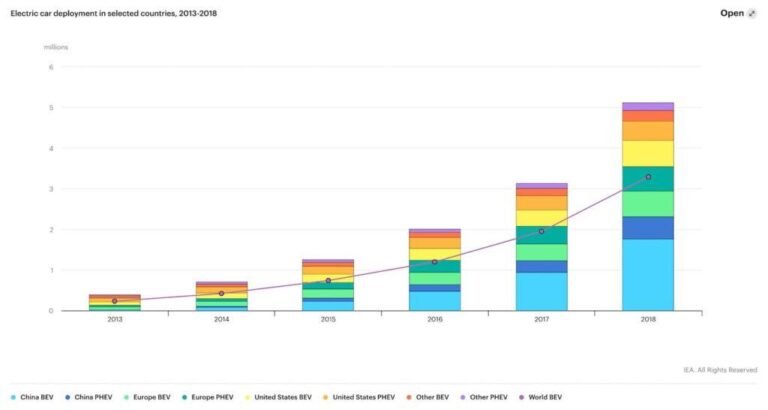Shares of Chinese electric vehicle manufacturers declined sharply following Tesla’s release of its Q3 earnings report, which fell short of market expectations. Investors reacted cautiously as Tesla, a key industry benchmark, posted results that tempered optimism about the EV sector’s near-term growth. The earnings miss has renewed concerns over competitive pressures and supply chain challenges facing China’s EV stocks, leading to broad sell-offs across the market. This article examines the impact of Tesla’s underwhelming financial performance on Chinese EV shares and the implications for investors.
China EV Stocks Dip Following Tesla’s Disappointing Third Quarter Results
Chinese electric vehicle manufacturers experienced a notable decline in stock prices after Tesla reported earnings that fell short of investor expectations in the third quarter. The shortfall in Tesla’s delivered vehicle numbers and profit margins cast a shadow over the sector, sparking concerns about growth momentum and competitive pressures. Key players such as NIO, Li Auto, and XPeng saw share prices drop amid worries that Tesla’s challenges might signal broader headwinds for the industry.
Market analysts highlighted several factors contributing to the dip:
- Softening global demand for EVs as economic uncertainties mount.
- Supply chain disruptions impacting production schedules across manufacturers.
- Intensified competition from emerging EV startups stealing market share.
Below is a snapshot of the stock performance for leading China EV players in the wake of Tesla’s results:
| Company | Stock Ticker | Price Change (%) |
|---|---|---|
| NIO Inc. | NIO | -4.7% |
| Li Auto Inc. | LI | -3.9% |
| XPeng Inc. | XPEV | -5.1% |
Market Analysis Reveals Investor Concerns Over Growth Prospects in Chinese Electric Vehicle Sector
Investor sentiment towards the Chinese electric vehicle (EV) market has noticeably cooled following Tesla’s Q3 earnings report, which fell short of expectations. Despite overall growth in global EV demand, concerns over profitability and expansion pace have emerged, leading to a sell-off of several key Chinese EV stocks. Analysts highlight that while companies like BYD and NIO continue to innovate, the pressure to meet ambitious delivery targets alongside regulatory uncertainties is creating a cautious environment. Market participants are now closely watching how Chinese EV manufacturers navigate supply chain challenges and domestic policy shifts, which could significantly influence their performance in the near term.
Key factors influencing the market downturn include:
- Rising battery costs affecting production margins
- Slowing demand growth amid intensifying competition
- Government incentives tapering off after initial stimulus
- Concerns over US-China trade tensions impacting export potential
| Company | Q3 Stock Performance | Market Share (%) |
|---|---|---|
| BYD | -4.5% | 18.2% |
| NIO | -6.7% | 7.9% |
| Xpeng | -5.3% | 6.4% |
| Li Auto | -5.0% | 5.5% |
Strategic Recommendations for Navigating Volatility in China Electric Vehicle Equities
Investors should adopt a diversified approach to mitigate the inherent risks linked with China’s electric vehicle market amid recent volatility. Focusing solely on headline players like Tesla can increase exposure to sudden earnings surprises and regulatory shifts. Instead, incorporating a mix of domestic manufacturers, battery suppliers, and technology firms can provide a more balanced risk profile and tap into various growth avenues within the sector.
Active monitoring of key indicators-such as government policy changes, supply chain dynamics, and consumer demand trends-remains crucial. Consider investing in companies with strong fundamentals, proven innovation pipelines, and a robust domestic market share. Below is a quick reference table highlighting essential factors to watch for:
| Key Factor | Why It Matters | Impact |
|---|---|---|
| Government Incentives | Drive adoption and manufacturing | Supports revenue growth |
| Battery Technology | Determines efficiency and cost | Influences competitive edge |
| Consumer Sentiment | Reflects market demand | Impacts sales volume |
- Hedge with global exposure: Offset market-specific volatility by including EV stocks from other regions.
- Set stop-losses: Protect capital against sharp downside movements in this fast-evolving sector.
- Stay informed: Keep abreast of quarterly earnings, production forecasts, and regulatory announcements.
Insights and Conclusions
As Tesla’s Q3 earnings fell short of market expectations, investor sentiment rippled through the electric vehicle sector, leading to a notable decline in China EV stocks. The results underscore the growing challenges facing the industry amid intensifying competition and evolving market dynamics. Moving forward, market participants will be closely monitoring upcoming earnings reports and policy developments to gauge the sector’s trajectory in an increasingly complex landscape.




